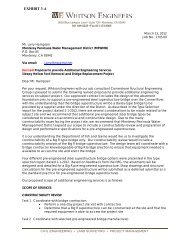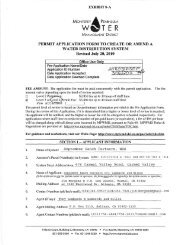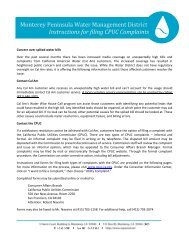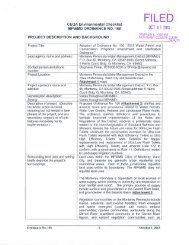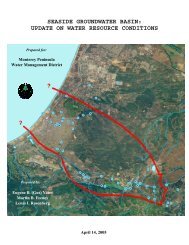FINAL REPORT Evaluation of Seawater Desalination Projects ...
FINAL REPORT Evaluation of Seawater Desalination Projects ...
FINAL REPORT Evaluation of Seawater Desalination Projects ...
You also want an ePaper? Increase the reach of your titles
YUMPU automatically turns print PDFs into web optimized ePapers that Google loves.
EVALUATION OF SEAWATER DESALINATION PROJECTS<br />
PROPOSED FOR THE MONTEREY PENINSULA<br />
completed some mitigation but the adequacy <strong>of</strong> previous actions to meet new requirements is<br />
not known at this time.<br />
The assumption in this report is that the MLPP has or will meet all <strong>of</strong> the new requirements<br />
<strong>of</strong> EPA’s Phase II rules. It is also assumed that the new use occurring with the withdrawal <strong>of</strong><br />
water from the MLPP discharge for the Coastal Water Project and/or the Monterey Bay<br />
Regional <strong>Seawater</strong> <strong>Desalination</strong> Project will not constitute a new use or change the MLPP’s<br />
requirements for withdrawal for cooling related to power generation. Potential changes<br />
resulting from Phase II rules or any other new regulations are speculative and not included<br />
here. However, the potential application to the MLPP adds a measure <strong>of</strong> risk to co-located<br />
projects. Assessment <strong>of</strong> potential impacts related to entrainment or impingement are only<br />
assessed related to extant regulations and requirements for operation <strong>of</strong> the MLPP.<br />
Resolution <strong>of</strong> the California State Lands Commission 52<br />
On April 17, 2006, the California State Lands Commission (Commission) adopted a<br />
resolution that expresses its intent not to approve any leases for new power plants using<br />
once-through cooling (OTC) systems and imposing certain conditions on lease renewals and<br />
extensions for existing facilities. The Commission resolved that intake <strong>of</strong> large volumes <strong>of</strong><br />
water for OTC has impacts on coastal organisms by entrainment and impingement. The<br />
Commission defined impingement by the occurrence <strong>of</strong> marine organisms trapped against<br />
components <strong>of</strong> the cooling water system, such as screens, where they die. Entrainment was<br />
defined as the induction <strong>of</strong> smaller marine organisms into and through the cooling water<br />
system where most, if not all, <strong>of</strong> the organisms are destroyed by mechanical damage,<br />
temperature increases, or toxic stress. In addition, the Commission resolved that OTC results<br />
in biological impacts through thermal discharge. They defined thermal discharge as the<br />
release <strong>of</strong> cooling water at temperatures above ambient conditions resulting in elevation <strong>of</strong><br />
the temperature <strong>of</strong> marine waters in the immediate vicinity <strong>of</strong> the outfall. The Commission<br />
found that these effects adversely impact coastal and ocean resources and uses that are within<br />
its jurisdiction.<br />
The Commission urged the California Energy Commission and the State Water Resources<br />
Control Board to expeditiously develop and implement policies that eliminate the impacts <strong>of</strong><br />
OTC on the environment from all new and existing power plants in California.<br />
The Commission stated it shall not approve leases for new power facilities that include OTC<br />
technologies.<br />
The Commission stated that it will not approve new leases for power facilities, or leases for<br />
re-powering existing facilities, or extensions or amendments <strong>of</strong> existing leases for existing<br />
52 The information about the California State Lands Commission’s resolution is reported at the Commission’s<br />
“meeting and voting records” for April 17, 2006, on http://www.slc.ca.gov/.<br />
Monterey Peninsula Water Management District 7-6




